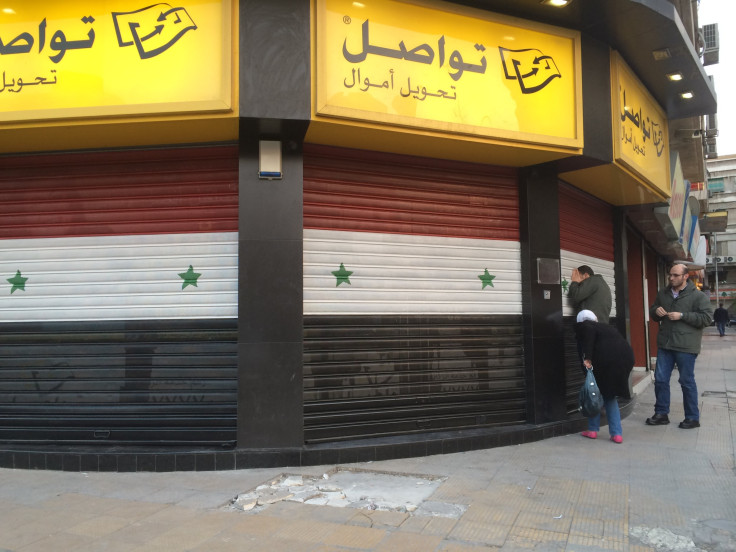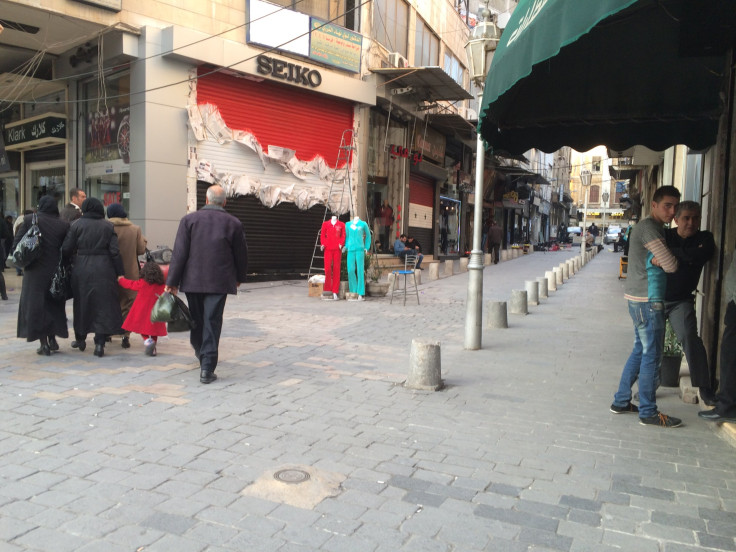Damascus Small Businesses And The War

DAMASCUS, Syria -- An armed man on a motorcycle stopped by Samir’s shop in the middle class Damascus neighborhood of Rukn al-Din and delivered a message last month.
“Better not take too long to paint. First offense is 5,000 pounds ($30), and second offense is prison,” the motorcyclist says.
He was referring to painting the shop front with the colors of the Syrian flag, an apparent attempt by Syrian authorities at coercing shopkeepers into showing support for the government.
Since Syria’s uprising-turned-civil war began nearly three years ago, the opposition has taken up a different flag, one that predates the current ruling Baath Party, to symbolize their cause. Brandishing the current Syrian flag has become a symbol for government loyalists.
Samir wasn't sure whether the motorcyclist was a state security official or a member of the local Popular Committee, civilians recruited and armed by the government to keep watch on their neighborhoods. In Damascus, only government officials can ride motorcycles. For security reasons, ordinary civilians are denied motorbike permits.
It's not clear why the authorities are suddenly pushing for a mass show of government support, but many speculate that it's in preparation for elections, which are scheduled to take place in June.
No one so far has officially nominated themselves to run. President Bashar al-Assad has said he would nominate himself “if that is what the Syrian people want.” But, since no mechanisms currently exists to poll the Syrian people on what they want, the onus has fallen on government officials to speak on behalf of the Syrian people. In the past few weeks, several high-ranking officials, including ministers, have announced that the Syrian people do indeed want Assad to run.
Many feel that the latest move by low-ranking government officials on motorbikes to paint the capital’s facade with loyalist colors is a push from high up to force what appears like grassroots support for the government.
And so far in the capital, hardly anyone is pushing back, at least not among the merchants.
“You have no choice but to do it," Yasser, whose family owns several shops, says. "When the motorcyclists made their rounds in my neighborhood, shopkeepers had their storefronts painted within hours. And these days you can find the painter just down the street, because they know they’re in high demand so they loiter around.”
"We Don't Want Any Trouble"
In more upscale Shaalan, where merchants say they haven't had specific visitations to compel them to paint, a more subtle pattern has emerged.
“It’s like peer pressure," Radwan, who owns a clothing shop, says. "We woke up one morning and found that three or four stores on my street had painted overnight. So now, if we don’t paint, we look bad. So we painted. We don’t want any trouble.” Asked how he felt about the government, he shrugged.
“To be honest, I support the idea of a revolution. But look what’s happened to the country! And frankly, it’s all about the business. It’s been rough, and I just want things to be normal and business to pick up again,” he says.
He echoes a sentiment common among many merchants who traditionally have been the backbone of Syria’s economy and a complacent partner of the Assad government.
“We don’t mess with their politics, and they don’t mess with our business,” went the usual saying among traditional Damascene merchant families in reference to the Assad regime, which has ruled for more than 40 years. This neutral stance has been a cause for much consternation by rebels toward the merchant class, with the rebels, in effect, accusing them of stifling the revolution. Last year, when it appeared that rebels around Damascus might be able to breach the capital, merchants and small entrepreneurs were especially nervous.
“It won’t matter that I’m with the uprising in my heart. If the rebels enter, they will eat us up and pick our bones, because they feel we didn’t support them,” one merchant says.
No More Business
It's difficult to ascertain how most merchants feel about the uprising. Anytime the subject comes up, they almost always steer the conversation toward their business, which has all but come to a standstill after three years of instability in the country.
“Ma fi business” has become a ubiquitous phrase these days. “Ma fi” is slang for “no more.”
Many shopowners have cut back on their hours, and some close for days or weeks at a time, figuring they are better off saving on electric bills and labor costs than keeping their doors open without any customers.
Inside the shop of one textiles wholesaler, the owner, Nasser, sits in a glass attic overlooking his near-empty shop. A narrow staircase leads up to his office, where he sits with a business associate playing backgammon.
“Come in. Come in,” he says, greeting his visitors, myself included.
Before the war, Nasser made an affluent living running the business that his family has tended for several generations. The home where he grew up in the posh Damascus neighborhood of Malki was appraised at around $3 million in 2010. Like more than 90 percent of Syrians, Nasser owns his home free and clear. (Private bank mortgages didn't arrive in Syria until 2005.)
But for the past three years, business has been so slow that Nasser now spends his time in his shop playing backgammon with other merchants in his alley, who are all suffering the same fate.
“Things are bad. We have no income, and living expenses around us have doubled and tripled,” he says, referring to the high inflation that has weighed on Syria’s currency because of the war.
“I don’t know how Assad can continue after all this blood,” he says. “But however this war ends, whether elections or reconciliation or intervention, or painting the flag everywhere, let it end soon. We’re tired. And we need to get back to business.”

© Copyright IBTimes 2025. All rights reserved.





















